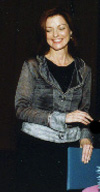
Maureen Dowd
In a scathing ad hominem attack on the Commission on Intelligence Capabilities in the New York Times today, Maureen Dowd protests: "It is absurd to have yet another investigation into the chuckleheaded assessments on Saddam's phantom W.M.D. that intentionally skirts how the $40 billion-a-year intelligence was molded and manufactured to fit the ideological schemes of those running the White House and Pentagon." She then implores, "Please, no more pantomime investigations."
Despite such ridicule from Dowd, the nine-person bipartisan Commission is not without credentials and the capability of intelligent speech. Co-chaired by Governor Charles S. Robb, the former Democratic Senator from Virginia, and Judge Laurence Silberman, who serves on both the U.S. Court of Appeals and U.S. Foreign Intelligence Surveillance Court of Review, its members include Walter Slocombe, President Clinton’s former Undersecretary of Defense, Judge Patricia Wald of the International Criminal Tribunal at the Hague, Senator John McCain, Republican from Arizona, and Charles Vest, the President of M.I.T. It had unprecedented access to all the documents used by the Intelligence Community in reaching its judgments about Iraq’s WMD programs, including what no journalist has ever seen: the chain of documents ranging from raw operational traffic produced by intelligence operators to finished intelligence products culminating in the President’s Daily Brief. Its 60-man staff interviewed hundreds of officials involved in producing and analyzing these documents. Aside from US intelligence reports, the Commission also reviewed the highly-classified assessments of British, Australian, and Israeli Commissions.
Doth Dowd protest too much? As it turns out, she has a a most compelling reason for scorning the Commission: its findings expose her own repeated misrepresentations of the event.
Consider Dowd’s amazingly smug assertion: "We all know what happened... Ahmad Chalabi conned his neocon pals, thinking he could run Iraq if he gave the Bush administration the smoking gun it needed to sell the war. Suddenly Curveball appeared, the relative of an aide to Mr. Chalabi, to become the lone C.I.A. source with the news that Iraq was cooking up biological agents in mobile facilities hidden from arms inspectors and Western spies."
Dowd here is partly correct: "Curveball"– an Iraqi engineer who defected to Germany– was a fabricator. According to the Commission, he provided false information that seriously misled the CIA to conclude Iraq had biological weapons. But she is wrong that Curveball was a product of the Bush administration. He defected during the Clinton Administration. He defected to Germany in 1999, and his (mis)information was passed by the Germans first to the DIA and then to the CIA a year or so before Bush was President. His false data on Iraq biological warfare went to Clinton's policy makers in 2000 and was included in the CIA’s revised 1999 National Intelligence Estimate (NIE). As he refused to (ever) meet with CIA or other US intelligence officers, the CIA could not squeeze more out of him than he gave to his German debriefers. Dowd’s assertion that "Suddenly Curveball appeared...." during the Bush administration is therefore demonstrably false. That Dowd repeated it in two columns-- March 31st and April 3rd-- after the facts were revealed in the Report gives her serial status.
The Commission also found that there was not a shred of evidence showing Curveball was influenced by Chalabi (as Dowd claimed in her March 31st column) or his INC organization. On page 107, the Commission says: "the CIA’s post-war investigations were unable to uncover any evidence that the INC or any other organization was directing Curveball to feed misleading information to the Intelligence Community. Instead, the post-war investigations concluded that Curveball’s reporting was not influenced by, controlled by, or connected to, the INC."
Moreover, whereas Dowd describes Chalabi as providing "the smoking gun" to the Bush Administration, the Commission concludes " In fact, over all, CIA’s post-war investigations revealed that INC-related sources had a minimal impact on pre-war assessments."
The Commission also undercuts an idea that has run amok among Dowd, as well as journalists at Newsweek and the New Yorker, that the CIA's faulty analysis of intelligence was the result of political pressure. On the contrary, the Commission found "Analysts universally asserted that in no instance did political pressure cause them to skew or alter any of their analytical judgments. We conclude that it was the paucity of intelligence and poor analytical tradecraft, rather than political pressure, that produced the inaccurate pre-war intelligence assessments."
The Commissions’ report is well worth reading (especially for journalists reporting on the issue). It shows that the enormous intelligence failure went beyond fabricating defectors. Technical intelligence, which CIA officials in the 1980s promised would provide an electronic Maginot Line against deception, proved to be just as vulnerable to error as human intelligence. Indeed, according to the report, it was the satellite imagery from Iraq that led to the staggering mistakes about Iraq’s chemical weapons. The problem lies in the elusive nature of "intelligence" itself. Whether obtained from humans , communication interceptors, or satellite cameras, the data requires interpretation. Unlike marbles, which can be lined up by size or color, each fragment of intelligence must be selected and placed in a scheme that exists in the mind of the beholder. In this case, the mind of the beholder, the CIA, was at least temporarily deranged between 1998 and 2003.

